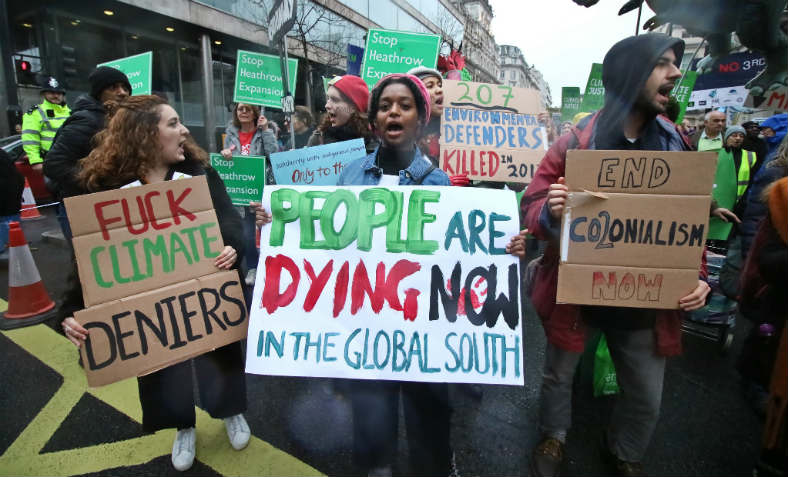 Protesters on the 'Together for Climate Justice' march on 1 December in London. Photo: Steve Eason, Flickr.
Protesters on the 'Together for Climate Justice' march on 1 December in London. Photo: Steve Eason, Flickr.
Profit and powerful interests are precipitating planetary disaster. Protests such as Saturday’s in London must be developed into a mass movement to force political change, argues Feyzi Ismail
As world leaders and campaign groups prepare to meet this week in Katowice, Poland for COP24 – the UN’s annual climate change conference held since 1995 – the Campaign Against Climate Change organised the Together for Climate Justice demonstration through central London yesterday, in solidarity with campaigners in Poland and people who bear the brunt of climate change in the Global South.
The demonstration was also called to demand that the Tories end fracking and move away from this new fossil fuel industry, and instead invest in clean, renewable energy that will transition Britain towards a low-carbon economy. Marching together were almost 2,000 environmental activists, trade unionists and others, including anti-fracking groups, campaigners against the Third Runway and activists from the new environmental group Extinction Rebellion.
It comes just weeks after the IPCC released a landmark report in which scientists warned that we have merely 12 years to keep the target for global warming to a maximum of 1.5°C, and that even half a degree warmer could drastically worsen the extreme weather we have been experiencing in recent years, from floods and droughts to forest fires and hurricanes.
Precipice
According to the report, the greatest difference that half a degree would make would be to nature: insects and plants are almost twice as likely to lose half their habitat at 2°C compared to 1.5°C. But while limiting global warming to 2°C would require reducing annual emissions by 20 percent below 2010 levels by 2030, limiting warming to 1.5°C would mean that emissions would need to drop by 40-50 percent. This is an extremely tall order when the consensus over climate change is crumbling and climate denial holds more weight than ever before, particularly with the elections of Trump in the US and now Bolsonaro in Brazil.
Trump has promised to withdraw from the Paris Agreement, while Bolsonaro promises to open up the Amazon to agribusiness, land-grabbers and illegal gold miners and loggers. Both believe that climate change is ideological. In the swelling gap between politics and science, the planet stands on a precipice. The US is the world’s second biggest source of emissions and the IPCC warns that reforestation is essential to moving to the 1.5C target, and to which the Amazon is crucial.
The IPCC report is also significant because it makes clear that the target for lobbying has to be politicians, political systems and corporations, rather than individuals. Of course individual lifestyle changes are important but the report identifies the scale of change that is needed, which only a major reversal in state policies, bound by law, can achieve. This was echoed at the demonstration in London by a number of speakers, including Sian Berry, co-leader of the Green Party, Clive Lewis MP and spokespeople from Extinction Rebellion, who also argued we need to use the range of tactics at our disposal – direct action, mass protests and so on – to force our government, and governments around the world, to act.
The aim of COP24 is to finalise the practical implementation of the 2015 Paris Agreement, which 195 countries have signed, ensuring that the increase in global average temperatures are limited to 1.5°C. The IPCC’s report will be presented to governments at the conference, and the stakes are high. The demonstrations in London and elsewhere, in solidarity with campaigners in Poland, will not go unnoticed, given that Poland’s nationalist Law and Justice Party remains committed to coal, which supplies 80 percent of its energy, and wants to build more coal-fired power plants. The biggest irony is that it has even endorsed leading coal companies in Poland to sponsor the conference.
Struggle
These companies, and not only in Poland, in concert with right-wing populist and far-right governments, are now at the forefront of climate scepticism on the one hand, and anti-immigration policies on the other. If governments will not act, and we know that the most powerful have no interests or incentives in reversing current emissions, then only a mass movement can force them to act. The fight against climate change therefore involves a class war – a war against those who would destroy people and planet for short-term profit – and a war against the right. Fighting the far right will become all the more important as climate refugees proliferate and need to migrate.
At certain crucial moments, the movements against war, racism and climate change must come together to call out individuals – Trump, Bolsonaro, and the likes of Tommy Robinson in this country – and reject the system they represent. It is possible to make the transition to an energy system that is sustainable, but only if it is linked to an economic system that is not dominated by the needs of profit, and where individuals have control of what is produced and how it is produced. A Corbyn government would facilitate the beginning of that transition. The only way to force the political will that is necessary for that to happen is to strengthen our mass movements for social justice.
Some images from Saturday

